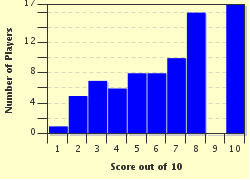Quiz Answer Key and Fun Facts
1. 1607, Virginia Company, Spread the Christian religion
2. 1621, William Alexander, 1st Earl of Stirling, Reward for service
3. 1622, Ferdinando Gorges and John Mason, Reward for service
4. 1620, Separatists/Pilgrims, Religious Freedom
5. 1630, Puritans, Religious Freedom
6. 1632, Lord Baltimore, Religious Freedom for Catholics
7. 1609, Virginia Company, Extend England's domain
8. 1620, Lord Baltimore, Fishing rights
9. 1664, New Netherland, Extend England's domain
10. 1681, Quakers, Payment of a debt
Source: Author
ponycargirl
This quiz was reviewed by FunTrivia editor
gtho4 before going online.
Any errors found in FunTrivia content are routinely corrected through our feedback system.

